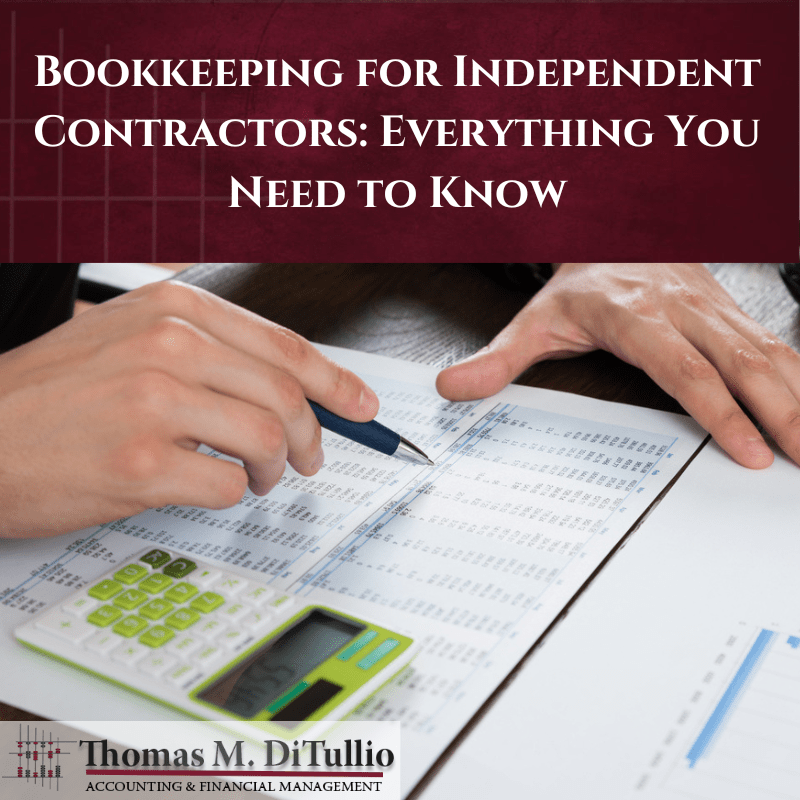Bookkeeping for Independent Contractors: Everything You Need to Know
If you work as an independent contractor, the Internal Revenue Service (IRS) classifies you as a business. You will need to perform bookkeeping and pay your business taxes to avoid potential problems. Unlike an employee, you won’t receive a W-2, and the businesses with which you work won’t pay the employer share of your Social Security and Medicare taxes. You will be responsible for paying the self-employment tax. Here’s what you should know about bookkeeping and taxes as an independent contractor from the accounting professionals at TMD Accounting.
Independent Contractors vs. Employees
Independent contractors are not considered to be employees of the businesses for which they work. Employees receive regular wages, have schedules created by their companies, and have taxes withheld from their paychecks. By contrast, independent contractors are paid for the projects on which they perform work, handle their schedules, and handle tax payments on their own.
You will also be responsible for buying private health insurance and will not be eligible for workers’ compensation if you are hurt on the job. Finally, independent contractors also are not protected by major employment laws.
Accounting for Independent Contractors
The first thing you should do is determine which accounting method to use, including the cash-basis or accrual-basis accounting methods. The cash-basis method is simple and simply means that you track your income upon its receipt and your expenses at the time you pay them. The accrual-basis method involves counting your income when you earn it and your expenses at the time they accrue rather than when you receive or pay them. A certified public accountant (CPA) at TMD Accounting can help you choose the method that is best for your independent contracting business.
How Independent Contractors Pay Taxes
As an independent contractor, you will have to pay the self-employment tax, which means you will pay taxes to Medicare and Social Security. The self-employment tax is reported on Schedule SE. Before you complete Schedule SE, you will first need to use Schedule C of Form 1040 to calculate your business’s total income or loss.
If you earn more than $600 while working for one of your clients, your client will send a Form 1099-MISC to you and the IRS. If you do not receive this form, you are still responsible for including the money that you earned. You should have a separate saving account you use to deposit money throughout the year to pay your self-employment tax so that you don’t have a huge tax bill at the end of the tax year. Independent contractors typically also must make quarterly estimated tax payments throughout the year.
Bookkeeping for Independent Contractors
You must conduct proper bookkeeping throughout the year as an independent contractor. Having organized books can also help to ensure that you don’t forget to pay accounts receivable, that you send your invoices on time, and that your bills and expenses are paid on time.
You will need to track all of the money that comes in and that you pay out for business-related expenses. You should have a separate business bank account and keep your personal account separate.
Track all business-related expenses and save receipts, including the following examples:
- Office lease expenses
- Business computer, phone, and printer receipts
- Hours spent per project
- Jobs you have completed
- How much you charge per hour for each client
- Operating expenses
- Money paid to you
- Bank transfers
- Travel expenses
- Bills for utilities, phone, and internet
- office supplies
- Career-related courses, subscriptions, and books
- Accounting software receipts
Establish your Business Entity
It is a good idea to register your business with the state and choose a legal entity structure under which to operate. You can opt to register as a sole proprietor, but this type of entity will not protect your personal assets from potential liability claims. Many independent contractors instead choose to form limited liability companies (LLCs), which offer liability protection. You should also apply for a federal employer identification number (FEIN) from the IRS even if you don’t have employees.
Once you establish your entity structure and get a FEIN, you can open a business bank account. Make sure to also open a business saving account to save money for your taxes and set aside at least 30% of your income each month. Keep your personal and business accounts separate to avoid potential problems.
Reconcile your accounts at the end of each month to make sure your books and accounts accurately reflect your income and expenses. Accounting software can be helpful, and hiring a professional from a firm that offers small business accounting services can be even more so. Most independent contractors can benefit from hiring a CPA to help during tax time to help prevent potential mistakes. Depending on your business, you might also benefit from having a CPA help throughout the year to provide guidance and support that could help you save money as you grow your business.
Find an Accountant for My Small Business
When you are an independent contractor, you are also a small business owner. Keeping on top of your books and taxes is critical to prevent potential tax problems. Call TMD Accounting today for help with your business accounting at 1-856-228-2205.

